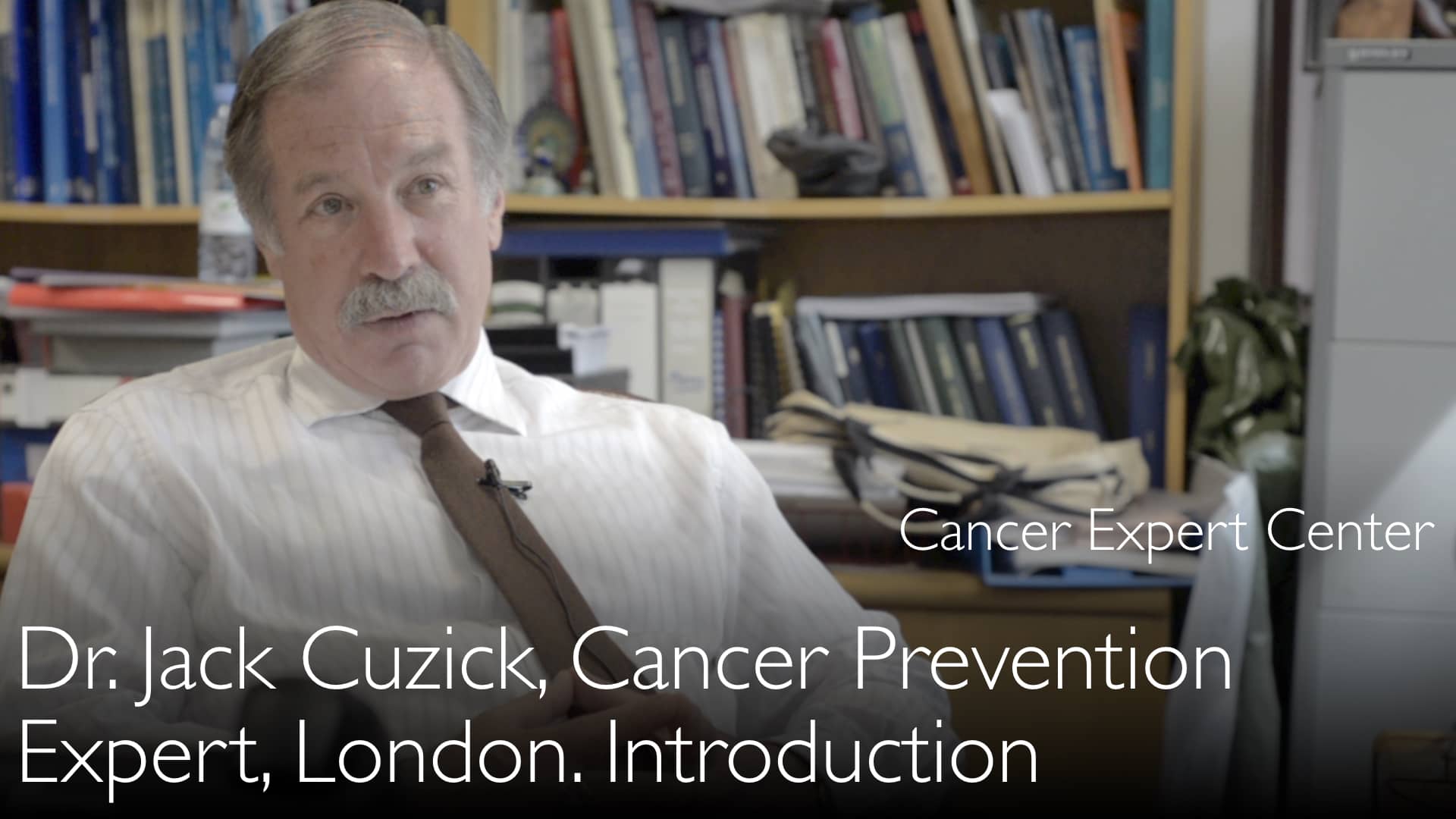前立腺がんの予防と治療における第一人者、Jack Cuzick医学博士(MD, PhD)が、限局性前立腺がんの治療において、根治的治療の重大なリスクと積極的監視(active surveillance)のメリットとのバランスについて解説します。真に進行性で緊急の介入を必要とするがんを見極めるという、診断上の課題に焦点を当てています。
限局性前立腺癌の治療:待機療法と根治的治療のリスク比較
セクションへ移動
限局性前立腺癌治療の課題
臨床的限局性前立腺癌は、患者と泌尿器科医の双方にとって診断と治療の面で大きな課題となります。Anton Titov医学博士がJack Cuzick医学博士・Ph.Dとともに、この複雑な意思決定プロセスについて議論します。中心的な問いは、積極的治療が常に必要なのか、それとも一部の患者では経過観察が適切な選択肢となりうるのか、という点です。
Jack Cuzick医学博士・Ph.Dによれば、この課題は早期乳癌以上に深刻で、過剰治療による合併症もより重篤になりがちです。この判断には、がんの進行リスクと根治的治療による生活を変える副作用とを慎重に比較検討することが求められます。
根治的前立腺摘除術の副作用と合併症
根治的前立腺摘除術(前立腺全摘術)は、生活の質に深刻な影響を及ぼす重大なリスクを伴います。Jack Cuzick医学博士・Ph.Dは、尿失禁が術後最大1年間続くことがある一般的な合併症であると指摘します。
性的機能障害も前立腺癌治療に頻繁に伴う帰結であり、患者の生活に大きな影響を与えます。こうした副作用は即時的で、しばしば永続的であるため、他のがん種に比べて根治的治療を選択する判断がより難しくなっています。
前立腺癌の過剰治療の問題
前立腺癌の過剰治療は、特にスクリーニングによる検出数の増加に伴い、深刻な臨床的問題となっています。Jack Cuzick医学博士・Ph.Dは、米国ではこれが非常に一般的であり、PSAスクリーニングによって症状を引き起こさず進行しない多くの早期前立腺癌が診断されていると説明します。
一部の専門家は、基底膜浸潤を含む組織学的基準をすべて満たしているにもかかわらず、特定の早期前立腺癌を「前癌状態」とみなすことさえあります。重要な洞察は、多くの前立腺癌が無増悪性の挙動を示し、未治療でも積極的に進行しないという点です。
スクリーニングと診断的ジレンマ
前立腺癌スクリーニングは、針生検などの簡便な手技によって多くの早期癌を検出するため、診断的ジレンマを生み出します。Anton Titov医学博士がこの問題をJack Cuzick医学博士・Ph.Dと探求するなかで、Cuzick博士は、スクリーニングによって組織学的に癌を同定できる一方で、どの癌が即時の積極的治療を必要とするかを常に判断できるわけではないと説明します。
課題は、無増悪性を維持する前立腺癌と、重篤な合併症や死亡を引き起こすまで進行する癌とを区別することにあります。この診断的課題は、基礎的な組織学を超えた、より優れたリスク層別化ツールの必要性を浮き彫りにしています。
低リスク癌の待機的観察のための同定
前立腺癌患者のなかで安全に経過観察が可能な患者を特定することは、極めて重要な臨床技術です。Jack Cuzick医学博士・Ph.Dは、即時の根治的治療ではなく待機療法が適切であるほどリスクが低い患者を判断する重要性について議論します。
このアプローチには、癌の進行兆候が現れた場合に迅速に治療を開始できるよう、慎重なモニタリングプロトコルと信頼性の高いバイオマーカーが必要です。目標は、治療に伴う不必要な合併症を回避しつつ、綿密な観察を通じて患者の安全性を確保することにあります。
前立腺癌治療の情報に基づいた意思決定
限局性前立腺癌の治療について情報に基づいた決定を行うには、治療のリスクと疾患の自然経過の両方を理解することが不可欠です。Anton Titov医学博士とJack Cuzick医学博士・Ph.Dは、即時の根治的治療が必要なほど高リスクの患者を特定する必要性を強調します。
この意思決定プロセスには、PSA値、Gleasonスコア、腫瘍量、患者の年齢や希望など、複数の要素を考慮すべきです。Anton Titov医学博士とJack Cuzick医学博士・Ph.Dの議論は、個別化されたアプローチが必須であり、がん制御の潜在的メリットと治療に伴う副作用の確実性とのバランスを取ることが重要であることを示しています。
全文書き起こし
Anton Titov医学博士: 前立腺癌治療について議論しましょう。臨床的限局性前立腺癌は診断と治療の面で課題を投げかけています。
Anton Titov医学博士: 前立腺全体を切除する必要はあるのでしょうか?限局性前立腺癌に対して積極的治療は必須なのでしょうか?それとも経過観察だけで十分なのでしょうか?
Anton Titov医学博士: 限局性前立腺癌患者をどのようにモニターすべきですか?あなたは限局性前立腺癌の複数の臨床試験を主導されてきました。それらの試験結果は何を示していますか?
Anton Titov医学博士: 限局性前立腺癌に対する最良の治療法は何でしょうか?
Jack Cuzick医学博士: 前立腺癌は早期乳癌よりもさらに難しい課題です。過剰治療は乳癌でも時に不必要ですが、乳癌の場合、その合併症は通常、前立腺癌治療と比べて深刻ではありません。
Jack Cuzick医学博士: 根治的前立腺摘除術は通常、尿失禁を伴います。それは最大1年間続くことがあります。前立腺癌治療はしばしば性的機能障害も引き起こします。
Jack Cuzick医学博士: そのため、前立腺癌の根治的治療を行う判断はより難しくなります。治療に伴う副作用と合併症がより重いからです。
Jack Cuzick医学博士: 前立腺癌スクリーニングによって多くの早期前立腺癌が検出されることも明らかです。これは米国では非常に一般的な状況です。
Jack Cuzick医学博士: これらの早期前立腺癌の一部を「前癌」と呼ぶ意見さえあります。すべての前立腺癌は形式的には「癌」ですが、それは組織学的に癌のすべての基準を満たしているためです。
Jack Cuzick医学博士: すべての前立腺癌は浸潤性で、基底膜を貫通します。しかし多くの前立腺癌は積極的には進行しません。
Jack Cuzick医学博士: これが前立腺癌診断の難しい点です。前立腺針生検のような簡便な手技を行うことができますが——
Anton Titov医学博士: 安全に経過観察できる患者を特定することは可能ですか?どの前立腺癌患者が即時の根治的治療を必要とするほど高リスクなのでしょうか?





